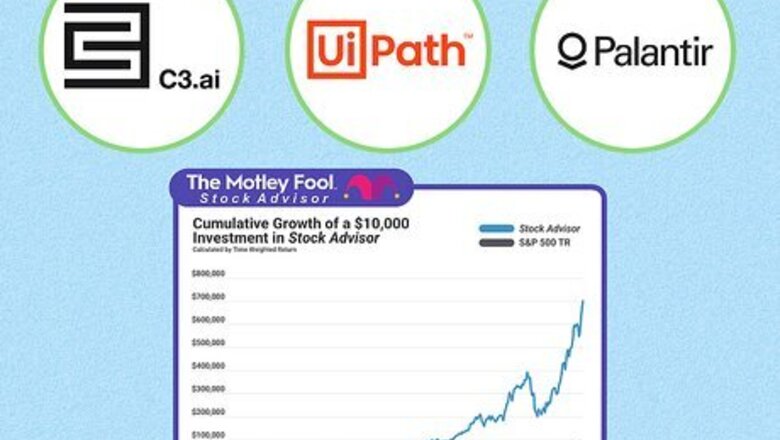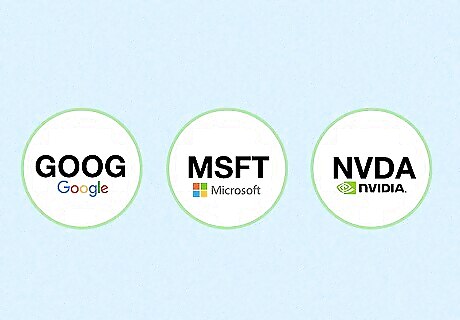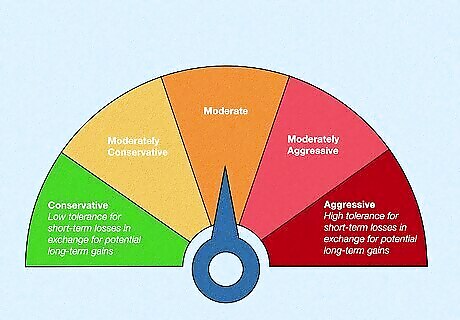
views
Different Ways to Invest in AI

Buying Stocks in AI Companies The most straightforward way to invest in AI is to directly buy shares in an AI-focused company. You can choose a specific sector of AI to invest in—e.g., microchip production, cloud services, or AI generative model training—or purchase shares in publicly traded AI companies. Example companies you could invest in include C3.ai (AI), UiPath (PATH), and Palantir (PLTR). Once you’ve researched and chosen a company you want to invest in, open a brokerage account with a platform that allows you to buy and sell individual stocks (popular ones include Charles Schwab, Fidelity, and Robinhood). From there, use the brokerage site to search for a company by its ticker symbol (e.g., “PLTR” for Palantir). Select your desired number of shares, and place your order! If you’re at a loss for what type of company you want to invest with or how to properly assess their risks and value, consider working with an investment research firm. The Motley Fool, for example, is a reputable site with a history of providing premium investment guidance to investors. They provide stock recommendations, detailed company analyses, and tools for building an ideal portfolio—all in all, working with services like these can help to simplify your investment process. As an added bonus, The Motley Fool offers discounts to first-time users—new members on the site can join Stock Advisor (the company’s basic plan) for $99 for the first year, which is 50% off the list price.

Buying Stocks in Large Companies That Use AI Alternatively, purchase shares in large, well-known tech companies that frequently use and innovate with AI (rather than purchasing shares in the AI companies themselves). In this case, you’re not directly investing in AI, but you are gaining exposure to it—this option can be more beneficial for investors with a lower risk tolerance. Larger companies generally have more stable positions in the market, diversified revenue streams, and a more transparent history of stocks and shares. Investing in these companies can also diversify your portfolio, as they come from different industries and sectors—but they’re all using AI to innovate. Some major tech companies that frequently employ and innovate with artificial intelligence include Google (GOOG), Microsoft (MSFT), and NVIDIA (NVDA). You can also look into businesses in different industries like pharmaceuticals (e.g., Pfizer - PFE), heavy equipment (e.g., John Deere - DE), and apparel (e.g., Nike - NKE). In order to buy stocks in these companies, you’ll want to open a brokerage account on a reputable platform (e.g., Charles Schwab, Fidelity, or Robinhood) and purchase shares directly.

Investing in an ETF or Mutual Fund Rather than focusing on a specific company and purchasing their stock, you can invest in a fund. Generally, these are exchange-traded funds (ETFs) or mutual funds. In a nutshell, investing in these funds means you’ll be invested in a group of stocks in order to give you a more diversified exposure to AI. Example funds include Global X Robotics & Artificial Intelligence ETF (BOTZ), ROBO Global Robotics & Automation Index ETF (ROBO), and iShares Robotics and Artificial Intelligence Multisector ETF (IRBO). Investing in funds can give you a more diversified portfolio with greater exposure and less risk with higher potential returns. These funds are also managed by experienced professionals who specialize in stock selection and investment. However, you must pay fund fees, which can eat into your long-term profits, and your exposure will be more diluted than it would be with individual shares. Similarly to purchasing individual shares, you’ll need to open a brokerage account in order to buy and sell ETFs and mutual funds. Once you’ve researched different AI funds and found one that aligns with your goals, place a buy order for the fund through your brokerage account. If you’re not sure whether a direct company stock or fund purchase is right for you, try consulting with an expert in the investment industry. Or you can work with a service like The Motley Fool, which provides in-depth investment guidance to its members.
What to Consider When Investing in AI

Timing The number one question you might (and should) be asking yourself is: Is now the right time to invest in AI? While it’s hard to give a concrete, evergreen answer to this question and determine the perfect time to make an investment decision, AI is a sector that many experts believe is set to experience continual growth. In the year 2025, generative AI has grown exponentially and continues to improve in quality and innovation—to most investors, these are cues that it may be a strategic time to invest in AI. However, it’s still important to research specific companies, carefully analyze the stock market, and assess your own risk tolerance before making any large investments.

Market Volatility The volatility of the stock market refers to how much and how quickly prices change over a given span of time. In times of increased economic uncertainty, the market is likely to be more volatile. However, new technologies and market disruptions can also increase volatility, making short-term investment returns more unpredictable. It’s important to analyze the volatility of the market at any given time when you’re considering investing. When it comes to AI investments, specifically, you likely will want to take a long-term approach and wait out any return on your investment—this’ll help you to ride out any short-term dips or changes.

Company History & Financial Health If you’re going to invest in any company—and particularly an AI company—you should be well-versed on any factors that can impact your returns. Thoroughly research the company’s history and expense ratios, or the annual fee of a fund’s total assets that an investor is expected to cover. Research individual stocks in the companies and review how they’ve trended in the stock market in the past. You should also keep up with any mentions of the company in AI tech news and current events.

Risks & Risk Tolerance There are always risks involved in investing, but even more so when it comes to new sectors like AI. First of all, you should understand your specific risk tolerance—aka, how willing you are to endure short-term losses in exchange for potential long-term gains. If your risk tolerance is more cautious and conservative, you may want to opt for investments in ETFs (exchange-traded funds) rather than individual stock shares. Also, AI is still a relatively new part of the market. It remains to be fully regulated by law, and if regulations on artificial intelligence services are introduced, they could have a significant impact on the market. There are also some ethical risks and factors when it comes to investing in AI. Artificial intelligence technology is highly controversial, as it’s already been shown to contribute to job displacement, increased economic inequality, misinformation, reduced critical thinking and social skills, privacy violations, and environmental damage. With all of these factors involved, you may want to consider your own ethical and moral stance on AI before making an investment in it.

Portfolio Diversification One of the best ways to potentially reduce investment risk is to maintain a diversified portfolio—in other words, by owning stock in a variety of different companies and sectors. This way, you avoid putting all your eggs in one basket—for example, if you only invest in AI, you stand to lose pretty much everything if the sector tanks. If you spread your investments out amongst different industries, on the other hand, you could face less risk. Before deciding to invest in AI, consider whether or not such an investment will leave you overly dependent on one industry. It can be difficult to learn how to balance your portfolio when you’re new to investing. That’s why investing services like The Motley Fool provide tools for building an ideal portfolio and tracking its performance over time. With the Epic membership plan (which you can get for $200 off as a new investor), you can even get insight on cautious, moderate, or aggressive portfolio strategies.
The Best AI Companies to Invest In (2025)
Nvidia (NASDAQ: NVDA) When it comes to hardware, Nvidia is one of the frontrunners in the AI industry. While Nvidia doesn’t provide AI services itself, the company develops the chips—or Graphics Processing Units (GPUs)—that allow artificial intelligence machines to learn and use information for generative purposes. These chips are widely used in prominent AI applications and sites, and the company is likely to continue toward significant growth in the coming years.
Taiwan Semiconductor Manufacturing (NYSE: TSM) Another company on the hardware side of AI, Taiwan Semiconductor Manufacturing (TSMC), creates and supplies physical chips to Nvidia. They’ve become successful by offering innovative technology, high-quality chip yields, reduced waste costs, and increased profits for customers. Like Nvidia, TSMC could continue growing for years to come.
Digital Realty Trust (NYSE: DLR) Digital Realty Trust is a real estate investment trust (REIT) that builds data centers to be rented out to various clients. Since AI workloads are likely to increase data center demand by up to 350% by 2030. Investors in Digital Realty Trust also receive a 2.9% dividend yield, which is a substantial profit when compared to most tech company shares.
Amazon (AMZN) While not an AI company per se, Amazon incorporates artificial intelligence in various ways throughout its complex and wide-reaching business model. By investing in Amazon, you’re indirectly investing in AI technologies and their projected growth over the coming years.
Alphabet (GOOG, GOOGL) Alphabet is Google’s parent company, and its services (particularly Cloud storage, health tech, and autonomous driving systems) frequently employ cutting-edge artificial intelligence. They even have their own department working on AI development, known as Google DeepMind, that’s produced AI technology breakthroughs in numerous distinct sectors.Of course, the stock market can change rapidly, as can the companies and shares that are worth investing in. For 24/7 insights into the best AI stocks to invest in (as well as when and how much to invest in them), consider working with a premium investment guidance service like The Motley Fool.




















Comments
0 comment